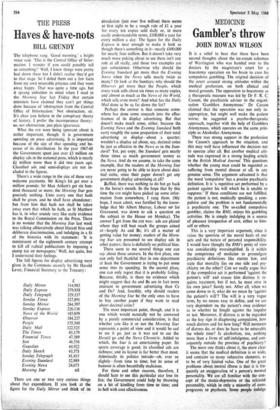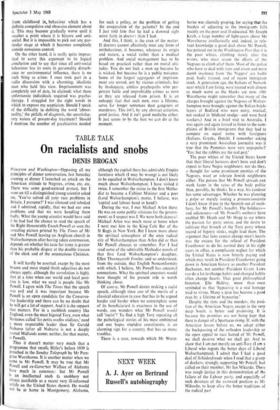Gambler's throw
MEDICINE JOHN ROWAN WILSON
It is a relief to hear that there have been second thoughts about the ice-cream salesman of Warrington who was handed over to the doctors by the magistrate's court for a leucotomy operation on his brain to cure his compulsive gambling. The original decision of the court aroused strong attitudes within the medical profession, on both clinical and moral grounds. The opposition to leucotomy as a therapeutic measure was led by Dr F. R. C. Casson, the psychiatric adviser to the organi- sation 'Gamblers Anonymous.' Dr Casson claimed that the operation was not only in- appropriate, but might well make the patient worse; he suggested a psycho-therapeutic approach, together with the help of Gamblers Anonymous, which operates on the same prin- ciple as Alcoholics Anonymous.
There was strong support in the profession for Casson's approach to the situation, and this may well have influenced the decision not to operate after all. But another medical atti- tude was expressed in a strong leading article in the British Medical Journal. This questions whether the young man could be regarded as suffering from mental disease at all, in any genuine sense_ The argument advanced is that the word 'compulsive' has a precise psychiatric definition. It is `a repetitive act performed by a patient against his will which he is unable to suppress.' If these conditions are not fulfilled, the patient is not, medically speaking, a com- pulsive and the problem is not fundamentally a psychiatric one. The so-called compulsive gambler, claims the BMJ, enjoys his gambling activities. He is simply indulging in a source of pleasure irrespective of cost, either to him- self or others.
This is a very important argument, since it raises the question of the moral basis of our acts and the nature of personal responsibility. I would have thought the BMA point of view was considerably oversimplified. Is it within the competence of medicine to promulgate psychiatric definitions like statute law, and state that morality lies on one side and psy- chiatry on the other? Can we really argue that if the compulsive act is performed 'against the patient's will' and causes him distress it re- quires treatment, but if not, he must stew in his own juice? Surely not. After all, when we come down to it, what do we mean by 'against the patient's will'? The will is a Very vague term, by no means easy to define, and we are very dependent on the patient's own evidence as to whether he fought against the impulse or not. Moreover, if distress is to be regarded as the key sign in diagnosing compulsion, how much distress and for how long? Will moments of distress do, or does he have to be miserable the whole time? Is alcoholism, too, nothing more than a form of self-indulgence, and con- sequently outside the province of psychiatry?
The more one thinks about it, the more clear it seems that the medical definition is so wide, and contains so many subjective elements, as to be of very limited value. One of the great problems about mental illness is that it is fre- quently an exaggeration of a person's normal personality. We are all familiar with the con- cept of the. manic-depressive or the schizoid personality, which in only 'a minority of cases progresses to psychosis. Some people indulge from childhood in behaviour which has a definite compulsive and obsessive element about it. This may become -gradually worse until it reaches a point where it is bizarre and anti- social. But it is impossible to pick out any par- ticular stage at which it becomes completely outside conscious control.
On the other hand, it is really quite imprac- tical to carry this argument to its logical conclusion and to say that since all anti-social behaviour has its roots in personality disturb- ance or environmental influence, there is no such thing as crime. I once took part in a radio discussion with a charming, idealistic man who held this view. Imprisonment was completely out of date, he claimed; what these unfortunate individuals required was psycho- therapy. I struggled for the right words in which to express my scepticism. Should I speak of the difficulty in defining the word 'abnor- mality,' the pitfalls of diagnosis, the unsatisfac- tory nature of present-day treatment? Should I mention the number of psychiatrists needed for such a policy, or the problem of getting the cooperation of the patients? In the end I just told him that he had a damned sight more faith in doctors than I had.
And this, I think, is the crux of the matter. If doctors cannot effectively treat any form of misbehaviour, it becomes, whatever its origin and nature, a social rather than a medical problem. And social management has to be based on practical rather than on moral atti- tudes. You do not lock a man up because he is wicked, but because he is a public nuisance. Some of the largest aggregates of imprison- ment are served, not by vicious criminals, but by inadequate, aimless psychopaths who per- petrate futile and unprofitable crimes as soon as they are released from prison. It is an unhappy fact that such men, over a lifetime, serve far longer sentences than gangsters or murderers. This isn't, by any abstract criterion, good justice. And it isn't good medicine either. It just seems to be the best we can do at the moment.







































 Previous page
Previous page